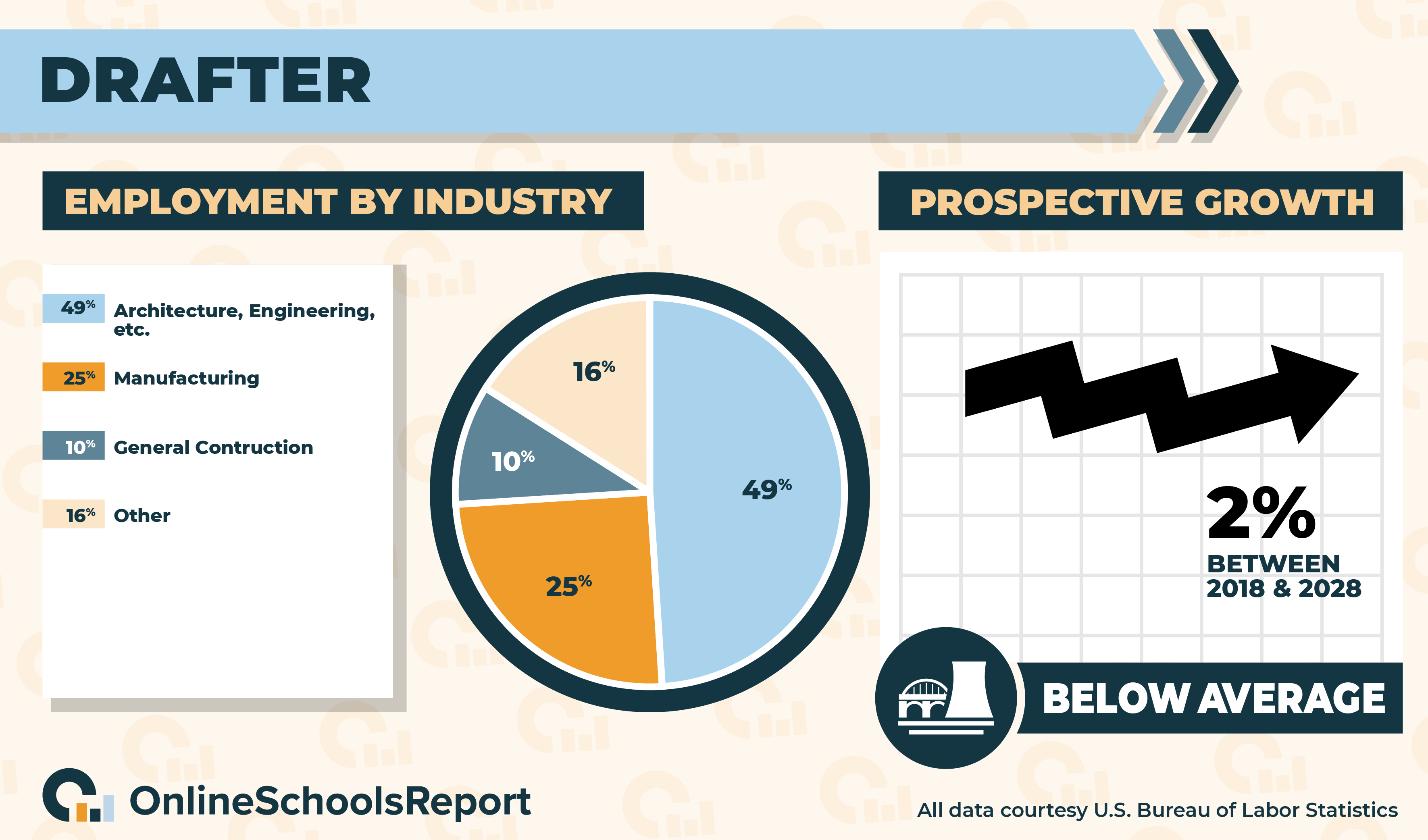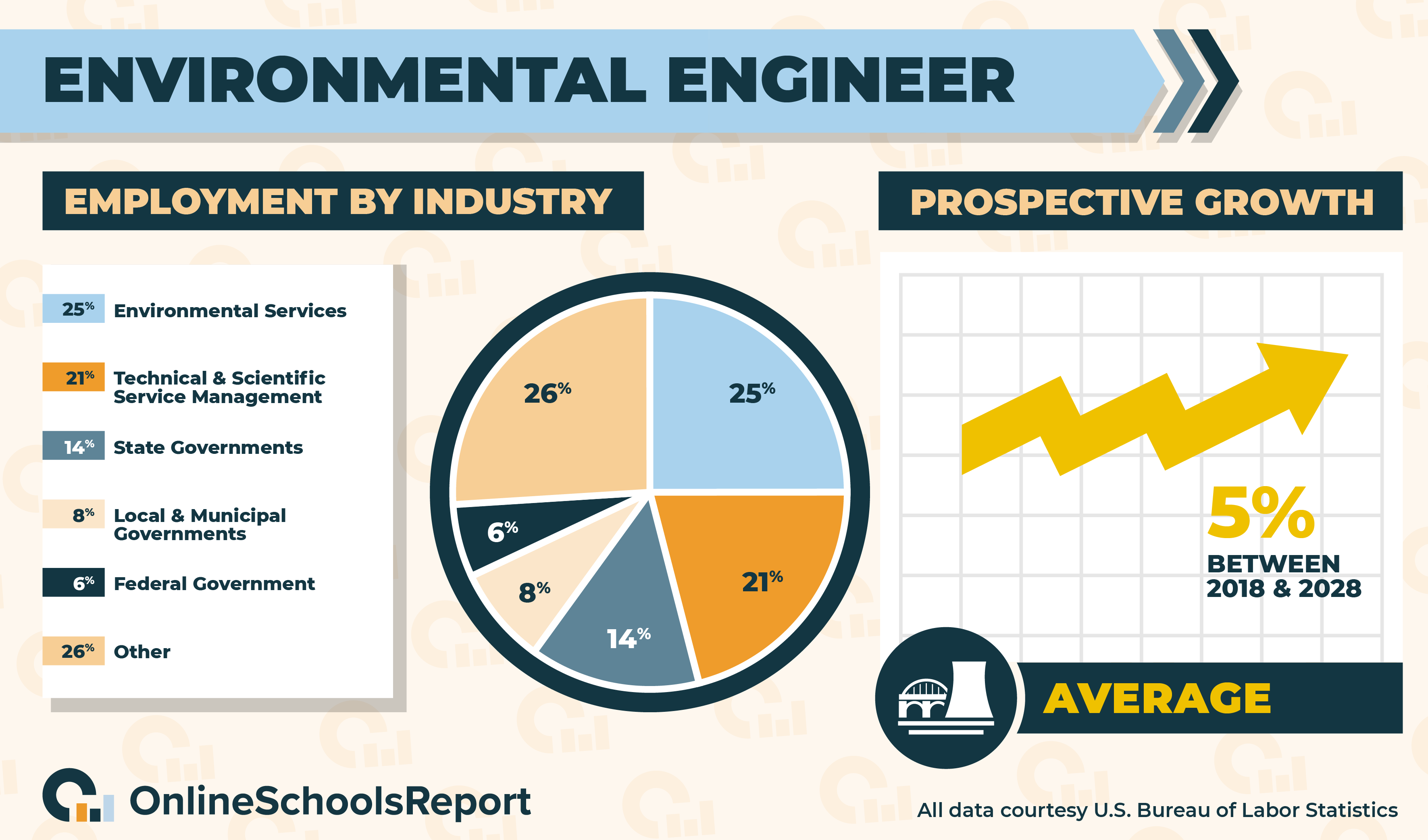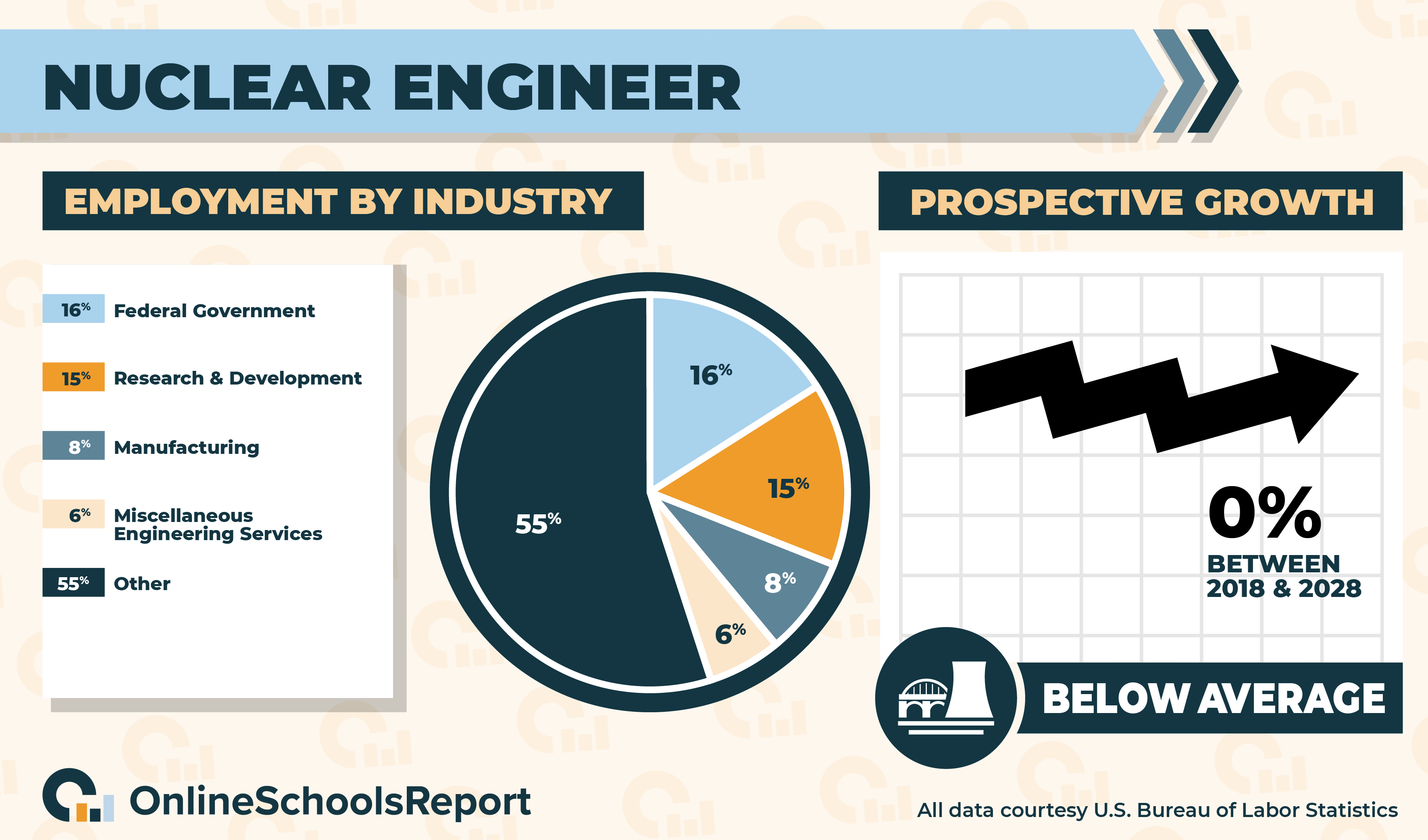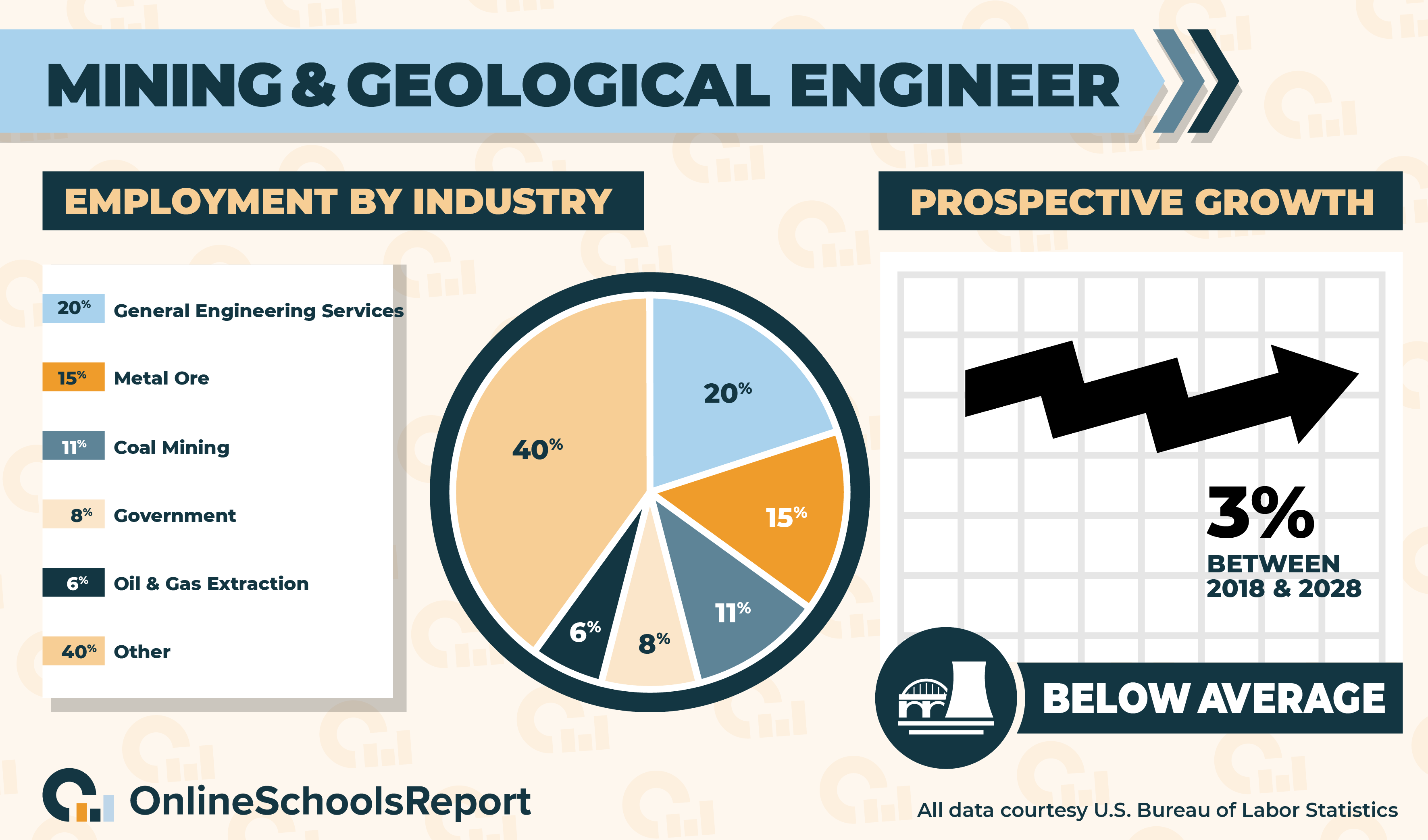Among all the marvels of human achievement, there is the work of a civil engineer, which includes building soaring skyscrapers and epic bridges, but also monuments to human history, as well as roads, highways, and airports.
Civil engineers have their hands in every aspect of the built human environment. It is a thrilling, creative, and growing engineering discipline, widely considered the second oldest, next to military engineering.
Want to get involved? It begins with a degree. This article will help you decide which degree in civil engineering is right for you and will give you some idea about the career paths waiting after graduation. If you’re interested in civil engineering, you’ve come to the right place.
Build your future with Online Schools Report and a degree in civil engineering.
What Is Civil Engineering

Civil engineers work in both the public and private sectors. That includes municipal, state, and national governments, as well as for private homeowners and multinational corporations. They work in the built environment but also in the natural world. Wherever there are humans, there are civil engineers.
Civil engineers plan projects, choose and evaluate construction material, and prepare cost estimates. They use design software and oversee surveying teams. Civil engineers may manage entire cities, ensuring water and electricity, as well as roads and bridges, are safe and reliable.
These are just a few of the many common responsibilities in this exciting and ever-changing career.
Jennifer Vilbig of Vilbig & Associates graduated in 2007 from Georgia Institute of Technology with a BS Civil Engineering.
“Earning a BS in Civil Engineering helped me to understand how to solve complex problems,” she tells Online Schools Report. “I knew the foundations taught and rigor of the classes in engineering school would give me the choice to launch my career in many different directions.”
As Jennifer touched on, earning a degree in civil engineering can serve as the starting point for many different engineering careers, such as construction engineering, geotechnical engineering, structural and transportation engineering, among others. Each has its own area of emphasis, and each requires its own kind of training.
No matter which career path related to civil engineering you prefer, a bachelor’s degree is most often all that’s required to begin. However, advanced degrees in civil engineering do increase job opportunity and earning potential.
Compensation for civil engineers is also impressive, at just under $90,000 a year on average, according to the Bureau of Labor Statistics. Additionally, careers in civil engineering are expected to grow at a rate of 6%, which is in-line with many other professions.
Careers in Civil Engineering
As we mentioned, working as a civil engineer is just one of the many career paths made possible with a degree in civil engineering. In addition to the exciting careers mentioned below, many who study civil engineering go on to work as estimators, fire risk assessors, urban designers, or as sustainability consultants.
Let’s take a closer look at just a few of the many exciting job opportunities made possible by a degree in civil engineering.
| Job Title | Approx. # Years of Education | Average Annual Salary |
| Surveyor | 4 | $63,420 |
| Drafter | 2 | $56,830 |
| Environmental Engineer | 4 | $88,860 |
| Nuclear Engineer | 4 | $113,460 |
| Mining and Geological Engineer | 4 | $91,160 |
All salary data is courtesy U.S. Bureau of Labor Statistics Occupational Outlook Handbook.
Surveyor

One career made possible by a degree in civil engineering is that of a surveyor. When it comes to surveying, precision is everything. One mistake could cost a project extra money or affect the viability of the entire endeavor.
Surveying is the first stage of bringing blueprints and planning documents to life in three-dimensional space. Surveyors work on location, using exact reference points to determine important features of a construction project.
When not working in the field, surveyors spend time researching land titles, as well as survey and land records. They look for pre-existing boundaries, such as property lines, and can work both alone or as part of a team. Surveyors also carefully record the results and data found while surveying to constantly verify accuracy.
Preparing plots, reports, and maps are also parts of the job for a surveyor. They present their findings to clients and sometimes government agencies.
According to the Bureau of Labor Statistics, a bachelor’s degree in civil engineering or a related subject is all that’s required to work as a surveyor, though advanced degrees can boost employment opportunities in the profession.
Data from the BLS also states that the average annual salary for a surveyor is a little over $63,000. There are just under 50,000 surveying jobs in the U.S., and the profession is expected to grow at a rate of 6% in the years spanning 2018–2028, which is on pace with many other professions.

At 69%, the vast majority of surveyors work in services related to architecture and engineering, while 10% work for the government. Following that, 8% work in general construction, and 6% are self-employed. The remaining 2% work in mining, quarrying, and oil and gas extraction.
Important professional and trade organizations for surveyors include the National Organization of Professional Trade Surveyors (NSPS), and the National Council of Examiners for Engineering and Surveying (NCEES). Both of these are great resources for more information about this exciting career choice.
Drafter

Drafters have a very important role in any construction project, taking the early conceptual drawing and plans of an architect or designer and translating them into a document that then can become a reality.
Working under the direct supervision of an engineer or architect, a drafter may also add details to architectural plans from their educational background and work experience with a variety of building techniques. This can include specifying dimensions, material choices, and otherwise advising on procedures for new products and designs involved in the construction project.
An associate degree is most often all that’s required to work as a drafter. Some community colleges, vocational schools, and trade schools offer certification to become what’s called a computer-aided design (CAD) operator, which many people like to pair with a civil engineering degree.
That’s while a bachelor’s degree in civil engineering will only broaden and deepen a professional drafter’s knowledge and understanding of design, engineering, and construction.
For a profession with relatively low educational requirements, there’s solid income potential in drafting. $56,830 is the average salary, according to the Bureau of Labor Statistics, and wherever there is construction, there is drafting.

There are roughly 200,000 drafting jobs in the U.S., but that number is expected to hold steady with little job growth projected by the BLS in the years spanning 2018–2028.
About half of all drafters, or 49%, work in architecture, engineering, or a related service, according to the Bureau of Labor Statistics. Following that, 25% work in manufacturing and 10% work in general construction.
Important trade and professional organizations for drafters include ACADIA, or the Association for Computer-Aided Design in Architecture, and the American Design Drafting Association, or ADDA.
Environmental Engineer

As you are probably aware, the earth’s environment is currently being threatened by human activity. On the frontlines of the fight to protect the planet are environmental engineers, applying principles of engineering as well as biology and chemistry to help fight for a better, more sustainable future.
Environmental engineers attack problems related to recycling, water and waste management, air pollution, and much more. They also keep a keen eye on environmental reports, as well as plans, permits, and standard operating procedures for corporations and other large organizations.
Environmental engineers also design and collaborate on projects like water reclamation facilities and act as a trusted authority for quality control checks and data analysis.
Technical support is also often provided by environmental engineers for environmental remediation projects. They may also keep tabs on environmental improvement programs, as well as industrial and municipal facilities and programs. Their job is to ensure compliance with all environmental regulations.
The work of an environmental engineer also reaches the highest levels of government and corporations. They act as advisors on projects like the return of a contaminated natural area to pristine condition.
For this work, environmental engineers are handsomely rewarded. According to the Bureau of Labor Statistics, the average salary of an environmental engineer is just under $90,000. The BLS also states there are about 55,000 environmental engineering jobs in the U.S., and the projected growth rate in this industry is estimated to 5% in the years ranging from 2018–2028.

A bachelor’s degree is the minimum requirement to work as an environmental engineer. Board certification is available through the American Academy of Environmental Engineers and Scientists (AAEES).
According to the BLS, 25% of environmental engineers work in environmental services. Following that, 21% work in the management of technical and scientific services, and 14% work for state governments. An additional 8% work for local and municipal governments, while 6% work for the federal government.
States with high levels of employment in the field of environmental engineering include California and Texas. Important professional organizations in the field of environmental engineering include the already mentioned AAEES as well as the International Society of Soil Mechanics and Geotechnical Engineering (ISSMGE), among others.
Nuclear Engineer

Nuclear power and radiation have found applications beyond simply powering our homes and cities. It is also useful in medical diagnosis and treatment and in a wide variety of other industries.
Nuclear engineers are there every step of the way, designing nuclear equipment and ensuring the safe maintenance and operation of functioning nuclear power plants.
This often involves creating written instruction on the operation of the plant and the safe disposal of nuclear waste. Other duties include identifying safety violations in a nuclear facility. Nuclear engineers may also test the acceptable usage of nuclear material.
If a safety violation is detected, a nuclear engineer must take corrective action. These actions can include plant shutdown due to an emergency or accident. In the event of such an incident, a nuclear engineer must then gather data to design and develop preventative measures to minimize the risk of recurrence.
The average salary of a nuclear engineer is about $114,000, according to the Bureau of Labor Statistics. There are only about 18,000 nuclear engineers in the U.S., and that’s not expected to change before 2028, making it a competitive job market.
The BLS states that 16% of all nuclear engineers work for the federal government, while 15% find work in research and development. Following that, 8% work in manufacturing, while 6% work in miscellaneous engineering services.

A bachelor’s degree in civil engineering is usually all that’s required to become a nuclear engineer. That’s so long as the engineering program is accredited by the Accreditation Board for Engineering and Technology (ABET).
The candidate must also earn a passing score on both the Fundamentals of Engineering (FE) exam and the Professional Engineering (PE) exam. Relevant work experience is also often required.
Following that, some seek licensure as a senior reactor operator, which is granted by the Nuclear Regulatory Commission. Many also pursue a master’s degree in nuclear engineering, which takes 12–18 months on average to complete.
Important trade and professional organizations for nuclear engineers include the American Nuclear Society (ANS), the Institute of Nuclear Materials Management (INMM), and the Nuclear Energy Institute (NEI). States with high levels of employment for nuclear engineers include Virginia and South Carolina.
Mining and Geological Engineer

Mining brings to light the raw materials that fuel our economy. Without it, our daily lives would be affected in countless ways. None of it would be possible without mining or geological engineers.
Geological engineers are like old-time prospectors: searching for rich mineral deposits and planning extraction in an environmentally friendly way.
That’s while mining engineers specialize in extracting one particular mineral, such as gold or coal. Mining safety engineers, which is a related profession, ensure safety in all mining operations.
Other duties include designing both open-pit and underground mines, as well as venturing deep into the earth, supervising the safe construction of mine shafts and tunnels.
Mining and geological engineers also devise the means by which the mineral or metal is transported to the processing facility. Mining and geological engineers may also monitor mine production, provide solutions to problems ranging from sustainability to land reclamation, and keep tabs on the safe general operation of the mine.
That’s a lot of responsibility, which is probably why compensation for mining and geological engineers is generous. The average annual salary is $91,160, according to the Bureau of Labor Statistics. There aren’t many job opportunities for mining and geological engineers, though, with under 6,000 jobs available in the U.S.
That isn’t expected to change any time soon. In the years spanning 2018–2028, the BLS projects a below-average growth rate of 3% in the profession. For this reason, many mining and geological engineers work overseas.

The BLS also states that 20% of mining and geological engineers work in general engineering services, while 15% mine metal ore. Following that, 11% work in coal mining, 8% work for the government, and 6% work in oil and gas extraction. States with high levels of employment in these professions include Texas and California.
A bachelor’s degree is the most basic requirement to work in mining and geological engineering, so long as the program is certified by the Accreditation Board for Engineering and Technology (ABET). Some schools offer a graduate certificate in mining and geological engineering.
Since mining and geological engineering bachelor’s degree programs are relatively rare, many begin their education with a degree in a related subject like civil engineering, so long as the program is certified by the Accreditation Board for Engineering and Technology (ABET).
Relevant work experience and a passing grade on both the Fundamentals of Engineering (FE) exam and the Professional Engineering (PE) exam are also required. Important trade and professional organizations include The American Institute of Mining, Metallurgical, and Petroleum Engineers (AIME), and The American Geosciences Institute.
Civil Engineering Degrees
No matter which career in civil engineering you choose, it all begins with a college degree. Here’s what you need to know about degree offerings in civil engineering as well as a few of the career options made possible by each degree.
Associate Degree in Civil Engineering

An associate degree (AS) in civil engineering is a common starting point for those just beginning their educational journey in college. They’re also a great choice for those seeking to get into the job market as quickly as possible in an entry-level position.
Some of the same community colleges, junior colleges, and trade schools that offer associate degrees in civil engineering also offer one-year certificates in civil engineering. This is a common choice for those who are already working in the profession to boost their credentials or for those seeking an even faster way to enter the workforce. One such certificate program is offered by the American Society of Civil Engineers.
Common coursework in civil engineering at the associate degree level includes computer-aided drafting, surveying, cartography, and topography. Other topics include soils and materials testing, materials statics, estimating, and general education.
As previously mentioned, credits earned in an AS degree program are often transferable to a four-year college or university. It’s also important to note that AS programs also prepare graduates to pass state and federal civil engineering certification exams.
Careers made possible by an AS degree in civil engineering include CAD operator, civil engineering technician, cartographer, and land surveyor. Given the lab-intensive, hands-on nature of an AS degree program in civil engineering, few are offered completely online.
Since engineering programs are math-intensive, passing a math placement exam is often required before beginning an AS program in civil engineering.
Otherwise, a high school diploma or equivalent is usually all that’s required to apply, but this may vary between programs. Most associate degree programs take two years to complete.
Bachelor’s Degree in Civil Engineering

Following an associate degree, a Bachelor of Science degree (BS) is the next level of education possible in civil engineering. Like any engineering program, BS programs in civil engineering will be math and writing intensive.
Again, due to the heavy field and lab work emphasis of a civil engineering degree, few are offered completely online, though many programs offer a mix of online and in-person coursework.
Other topics and skills taught in a bachelor’s degree program in civil engineering include surveying and hydraulics, and computer-aided drafting. Other subjects include construction management, engineering physics, hydrology, technical communications, wastewater handling, economics, and general education.
A bachelor’s degree is commonly all that is required by an employer for a wide variety of entry-level positions in civil engineering, so long as the program is accredited through the Accreditation Board for Engineering and Technology (ABET). It is increasingly common, however, for advanced degrees to be required by employers.
Post graduation, civil engineers must also complete a civil engineering internship, choose a specialty or concentration within the field of civil engineering, and then successfully pass relevant exams for certification. Another common career path following graduation is that of a civil engineering technician.
Acceptance into a bachelor’s degree program in civil engineering requires a high school diploma or equivalent, as well as submitting ACT and SAT scores, letters of recommendation, or a personal statement of intent. Program requirements vary.
Many students transfer credits from an AS program to complete their degree, and after graduation, some go on to pursue advanced degrees in civil engineering. 120 semester credits, 180 quarter credits, or about 40 college courses are most often required to complete a bachelor’s degree, with a GPA of at least 2.0, though requirements may vary between programs.
Master’s Degree in Civil Engineering

Building on coursework that begins at the undergraduate level, a Master of Science (MS) in Civil Engineering program allows a student to concentrate in a specific area of interest. This gives graduates a competitive advantage in the job market.
Those areas of emphasis include construction, public works engineering, geotechnical and materials engineering, among others. Like an undergraduate program in civil engineering, an MS program must also be accredited through the Accreditation Board for Engineering and Technology (ABET). Not all programs hold this accreditation.
Additional coursework in an MS program in civil engineering will cover topics like climate change, solid and structural mechanics, and sustainable cities. This can vary depending on the area of emphasis chosen by the student.
As previously stated, bachelor’s degrees are often the minimum education requirement for most employers in civil engineering. However, one career made possible by an MS in Civil Engineering is that of an urban planner.
Additional licensing to work as an urban planner varies by state, though voluntary certification is available through the American Institute of Certified Planners.
In addition to a master’s degree, many employers require up to two years of work experience in planning or a related field for entry-level positions. This can also sometimes be satisfied through an internship.
Most master’s degree programs take up to two years to complete. A terminal thesis is required for completion, which is written and developed with the guidance of a faculty advisor. Many MS programs in civil engineering are available online.
Admittance into most MS programs requires a bachelor’s degree with a minimum GPA of 3.0 in civil engineering or a related field, so long as certain prerequisites are satisfied. These prerequisites vary between programs. GRE or GMAT test scores may also be required, as well as letters of recommendation or statements of personal interest.
Doctorate Degree in Civil Engineering

There are many PhD programs offered in civil engineering. Some award a general PhD in Civil Engineering, while others allow for areas of interest, such as a PhD in Environmental and Water Resources Engineering.
Other areas of concentration include transportation systems, geoenvironmental engineering, geotechnical engineering, geoenvironmental engineering, among others.
One career made possible with a doctorate in civil engineering is that of a hydrologist. Some hydrologists find work holding just a bachelor’s degree, but a PhD is most often required for those interested in advanced research, management and leadership positions, or to teach at the level of a college or university.
Additional hydrology certification requirements vary between states. Voluntary certification is available from the American Institute of Hydrology (AIH), including a two-part written exam.
Although few employers require a PhD as a minimum education requirement to work in positions related to civil engineering, holding a PhD does provide a competitive advantage in the job market, especially for positions in research, management, or teaching.
A bachelor’s and master’s degree is required to gain entry into most PhD programs, with a minimum GPA of 3.0. Submitting a GRE score is also commonly required, as well as passing a qualification exam and an oral presentation exam for some programs. Letters of recommendation or a statement of personal intent may also be part of the application process.
PhD programs in civil engineering can take up to five years to complete. The majority of the coursework will be completed in the first two years, with the remaining time spent working on thesis research and defense.





